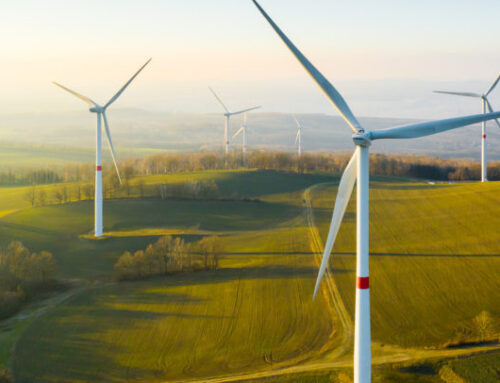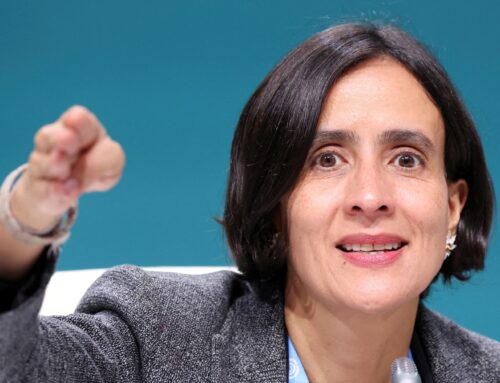Masdar’s Solar-Plus-Battery Project Will Redefine Reliable Energy
February 9, 2025
Masdar wants to discredit the critics of wind and solar energy—the ones who say they only work part-time and are overpriced. The clean energy company is building the largest solar-plus battery project worldwide, a plant that will run 24 hours a day at cost-competitive rates.
When this plant is operational in 2027, it will be the largest renewable energy facility in the world—nearly three times the size of the next biggest battery installation. The Middle East is an excellent location to establish such a plant, given the abundance of sunshine and the progressive nature of Masdar, which is headquartered in the United Arab Emirates and is leading the global clean energy transition.
“We only invest in commercially viable projects that yield reasonable returns,” says Mazin Khan, chief financial officer of Masdar, during our conversation in Abu Dhabi. “Depending on the price of natural gas, it may be less expensive than other baseload fuels. When we undertake a large-scale project, we leave no stone unturned, whether technical or financial. We ensure the goal is achievable,” and advanced batteries elevate this into the baseload category.
This will be a 5.2-gigawatt solar photovoltaic plant incorporating 19 gigawatt-hours of battery storage. It will provide 1 gigawatt of baseload power, functioning day and night. It will displace 5.7 million tons of CO2 annually—equivalent to planting 100 million trees and covering 90 square kilometers, roughly the size of Copenhagen. The estimated cost is $6 billion, comparable to the Panama Canal’s expansion between 2007 and 2016.
This type of project could be implemented in other locations. However, its effectiveness relies on multiple factors, including the modernity of the grid, access to technology, and the availability of wind and solar resources. Battery prices, particularly lithium-ion, have fallen significantly, making energy storage more affordable. Importantly, countries can depend on local energy resources and reduce their reliance on imports. Major companies such as Tesla, Fluency, and BYD are investing in large-scale battery storage.
Declining Technology Prices
While battery costs may be falling, they are still high. Consequently, the technology will be out of reach for some developing countries. Additionally, many utilities are hesitant to invest due to the lack of regulatory incentives—even though their grids are outdated.
Nevertheless, market fundamentals favor the entry of solar-plus-storage projects. The growth of artificial intelligence and the emerging world’s economic spurt are significant factors. Masdar Chairman Dr. Sultan Al Jaber addressed an audience and said the entrance of AI means electricity growth will shoot up by 250% by 2050, necessitating newer and cleaner energy ideas.
“For decades, the biggest barrier facing renewable energy has been intermittency,” Al Jaber said. “It has been the moonshot challenge of our time. How can we power a world that never sleeps with energy sources that do? How can we transform renewable resources into reliable power? Battery storage is the fastest-growing energy technology in the world today. A record 100 gigawatts of storage will be added to the grid this year” — a tiny fraction of the overall power demand.
Masdar has a proven track record. It developed Al Dhafra, a major project in 2023 that supplies 2 gigawatts to the plant’s off-taker, Emirates Water and Electricity Company. The UAE is home to multiple solar plants, including one of the world’s largest: Noor Abu Dhabi, generating over 1,100 megawatts—a facility of 3.2 million solar panels connecting to the grid. Built in 2019 for $870 million, it can provide electricity to 90,000 people.
The UAE aims to produce half of its electricity from clean energy sources by 2050, which will help reduce its carbon footprint by 70%.
Masdar also developed the Desert Harvest 1 and Desert Harvest 2 solar-plus-battery projects in Southern California in 2020. Together, they feature more than 500,000 solar panels and can power 77,000 homes.
As of the end of 2024, Masdar’s renewable energy portfolio has grown to over 51 gigawatts, including projects that are under construction, in the pipeline, or operational. This marks a 150% increase from 20 gigawatts in 2022. The total investment in 2024 amounted to $8 billion in equity and over $4.5 billion in project financing across nine countries, underscoring Masdar’s commitment to renewable energy and its aim to reach 100 gigawatts by 2030. Its total investment was reportedly $30 billion, distributed across 40 countries.
Perfect Recipe For Success
Masdar explained that it succeeds due to supportive government policies, a commitment to decarbonization, and declining technology costs. If the United States government withdraws from global pacts, it will create more opportunities for other countries and companies.
“We are leading in renewable energy globally,” Masdar’s Chief Operating Officer Abdulaziz Alobaidli told me. “We are eager to export the concept of solar-plus-battery storage. Every market has its own circumstances: There must be ample sunshine, demand, and capacity on the grid to support such a project. It is financially viable and meets all the criteria for carbon finance.”
Masdar’s CFO Mazin Khan adds, “The Middle East is where innovation and renewables start. Once something is proven here, it can be replicated. We have the perfect recipe for success.”
Indeed, if an oil-driven country can transition to renewable energy, others can follow suit. Norway and Scotland, for example, generate nearly all their electricity from green energy sources: hydro and wind, respectively. Economic factors and future generations compel this shift to cleaner energy. Numerous studies have found that rising temperatures result in adverse weather patterns that undermine national wealth.
Masdar typifies the UAE’s commitment to clean energy and decarbonization. Hats off to them for helping bring the world into the 21st Century. Their investments are strategic—a risk that will yield financial returns, create jobs, and enhance living conditions across the planet.
Search
RECENT PRESS RELEASES
Related Post


